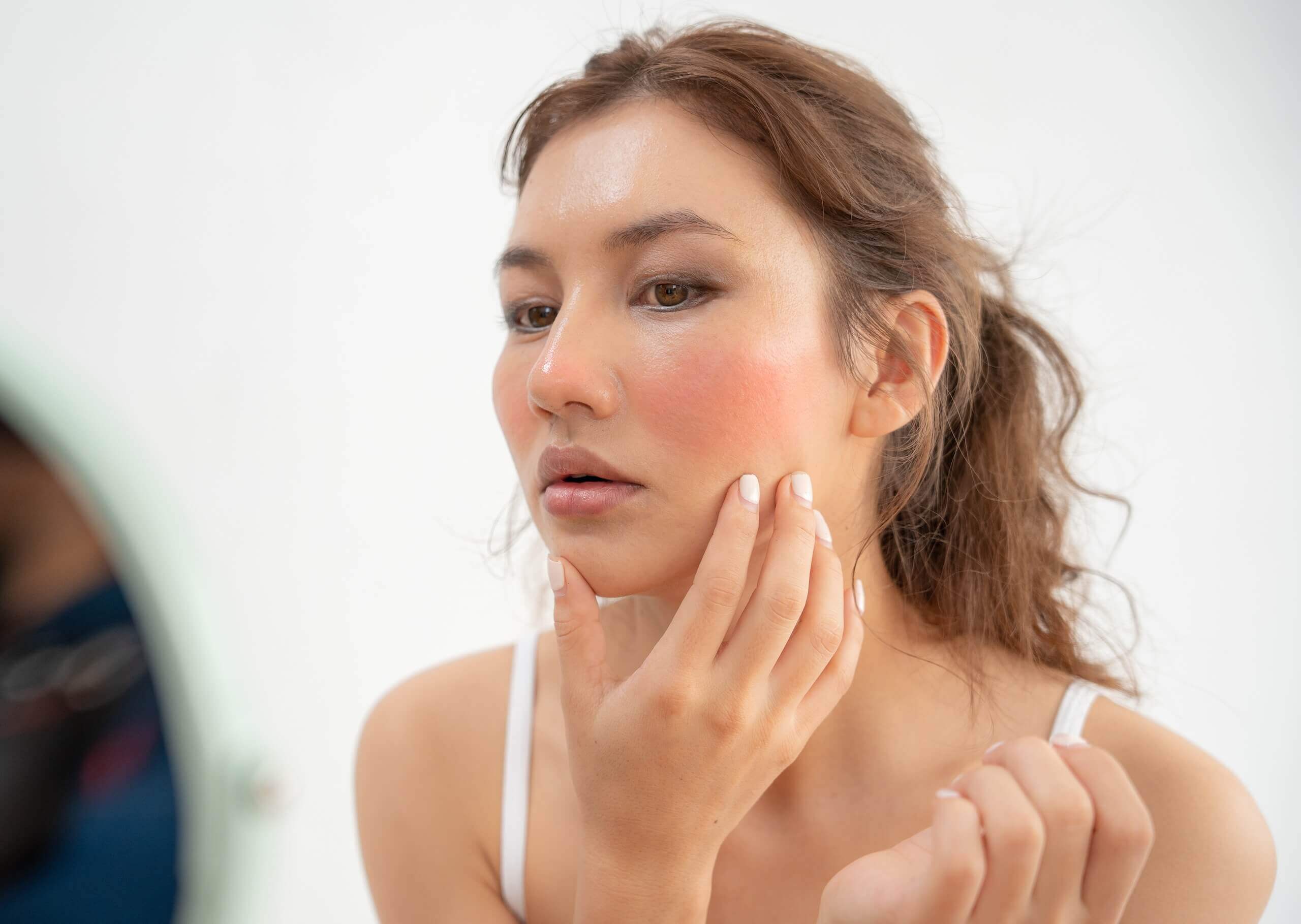
Spring is in the air—and so is pollen. While most people associate allergy season with sneezing, congestion, or watery eyes, the truth is that seasonal allergies can also take a toll on your skin. If your complexion has felt dull, irritated, or puffier than usual, those changes may be more than just coincidence.
Even if you’re not sneezing or reaching for antihistamines, your skin might still be reacting to allergens in the air. That’s because your immune system’s response to things like pollen doesn’t stop at your sinuses—it can trigger subtle inflammation throughout the body, including the skin. This can affect your skin’s behavior, appearance, and even its protective barrier.
So what does that look like—and what can you do about it? Let’s break it down.
Why Do Allergies Affect Your Skin?
When your body encounters allergens—like pollen, dust, or mold—it reacts by releasing histamines, chemicals produced by your immune system to help defend against perceived threats. While they’re meant to protect you, histamines also trigger inflammation, which can affect your skin in subtle but frustrating ways.
This immune response causes a chain reaction that:
- Increases blood flow, which may leave skin looking flushed or feeling more sensitive
- Disrupts your skin barrier by triggering inflammation and oxidative stress, making it harder to retain moisture and defend against irritants
- Promotes fluid retention, especially around the eyes, which contributes to puffiness
Your skin barrier is your body’s first line of defense against the outside world. When it’s compromised by histamine activity, your skin becomes more reactive, more prone to dryness or irritation, and slower to recover from even minor stress.
Common Allergy-Related Skin Symptoms (And Why They Happen)
1. Puffy Eyes and Dark Circles
One of the telltale signs of seasonal allergies is waking up with swollen eyes or under-eye circles that just won’t fade. Allergies can cause fluid to build up in the delicate tissue around your eyes, while slowed circulation contributes to darkness and discoloration.
Worse? Rubbing your eyes (a natural reaction to itchiness) breaks down capillaries and inflames the area even more, leading to bumps under the eyes or puffiness that lingers.
If you’ve been Googling how to get rid of puffy eyes instantly, you’re definitely not alone.
2. Redness and Skin Irritation
That red, blotchy look some people get during allergy season? It’s caused by increased blood flow triggered by histamines. The result is skin that feels warm, looks flushed, and reacts more intensely to things like skincare products, weather, or even sweat.
You might also notice itchy or irritated skin, especially on the face, where pollen and allergens tend to settle. Even people who don’t normally have sensitive skin can develop sudden reactivity.
3. Acne and Breakouts
Wondering if seasonal allergies can cause acne? The answer: kind of. While allergies don’t directly clog pores, they do increase inflammation, which can lead to stress-related breakouts or worsen existing acne.
On top of that, a disrupted skin barrier can lead to excess oil production in some people, while others may start using heavier products to combat irritation—both of which can lead to more blemishes. For many, it’s the perfect storm of allergies and acne.
4. Dry or Flaky Skin
If your skin feels tight, rough, or flaky, your allergies might be the reason. As histamines impact your skin’s ability to hold moisture, the skin barrier becomes compromised, allowing hydration to escape and leaving your face dry or visibly textured.
This can be especially frustrating when you’re already trying to soothe redness or inflammation, only to find that your skin is now dry and flaky too.
5. Hives and Allergy Bumps
In more extreme cases, or for people with eczema or sensitive skin, allergies can trigger hives or small, raised allergy bumps. These can show up anywhere but often appear on the neck, chest, or face—and they tend to feel itchy or hot.
Wondering if pollen can cause hives? It can, especially when your immune system is already in overdrive and your skin is more reactive than usual.
What You Can Do to Protect Your Skin During Allergy Season
When allergy season flares up, it’s easy to feel like your skin is at the mercy of the elements. But the truth is, there are powerful ways to support your skin—both from the inside out and right at the surface.
Here’s how you can help your skin stay calm, clear, and resilient, even when pollen counts are high.
Internal Support: Skinade
Think of Skinade as your skin’s secret weapon during allergy season. This award-winning collagen drink works from within, delivering a blend of B vitamins, MSM, omega fatty acids, and antioxidants that target the underlying causes of allergy-affected skin.
- Supports hydration and circulation, which can help reduce dark circles and tired-looking skin
- Helps calm inflammation and reduce puffiness, especially around the eyes
- Strengthens your skin barrier from the inside out, making it more resilient to irritation
Because Skinade is a professional-grade supplement, it’s only available through licensed providers—like Gulf Coast Facial Plastics. If you’ve been struggling with dullness, puffiness, or dryness during allergy season, Skinade may be the missing piece in your skincare routine.
Topical Care: ZO® Skincare for Redness & Sensitivity
While internal support helps address deeper inflammation, you can also soothe and protect your skin’s surface with the right topical products. We offer ZO® Skin Health, a medical-grade skincare line designed for people who experience redness, reactivity, or skin barrier issues—all common during allergy season.
ZO®’s calming formulations are ideal for:
- Reducing visible redness
- Repairing the skin barrier after histamine-induced stress
- Minimizing flare-ups in allergy-prone or sensitive skin
The Gulf Coast Facial Plastics team can help you choose a regimen tailored to your skin type and seasonal needs—whether you’re looking to hydrate, calm irritation, or boost your overall glow.
Quick Tips to Calm Allergy-Affected Skin
Sometimes, small changes can make a big difference in how your skin responds during allergy season. Here are a few quick ways to reduce irritation and keep your skin feeling more balanced:
- Wash your face after spending time outside to remove pollen and other allergens
- Apply a cold compress to soothe puffy, swollen eyes
- Use a gentle, fragrance-free moisturizer to support your skin barrier
- Avoid long, hot showers—lukewarm water is less drying
- Wear sunglasses and hats outdoors to shield your skin from airborne irritants
When to See a Skincare or Medical Expert
If you’re experiencing serious allergy symptoms—like ongoing hives, swelling, or intense itching—it’s best to consult your primary care provider, allergist, or dermatologist.
But if you’re simply feeling like allergy season is taking a toll on how your skin looks or feels, the team at Gulf Coast Facial Plastics can help. With options like Skinade collagen support and ZO® Skin Health for redness and sensitivity, Gulf Coast Facial Plastics offers expert solutions to help your skin stay calm, hydrated, and glowing—all season long.
Ready to Soothe Your Skin From the Inside Out?
Stop by Gulf Coast Facial Plastics to purchase Skinade or ask about a skincare plan tailored to your allergy-season concerns. As an exclusive provider of high-end products not available in stores, we are your trusted destination for expert-backed skin support.

 (850) 784-7722
(850) 784-7722




